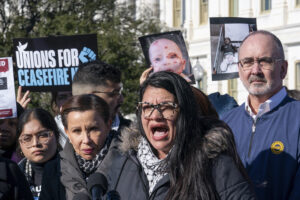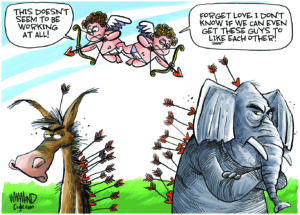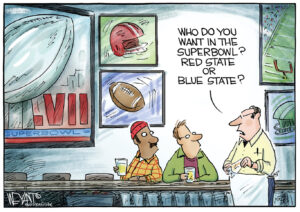Whatever Happened to Ending the War?
Back in 2006, the Iraq Study Group said that all U.S. combat brigades in Iraq should be out by now. They also warned that an escalation, or "surge," "would not solve the fundamental cause of violence in Iraq."WASHINGTON — I do not recall precisely when I created a file folder with this tab: “Iraq endgame.” Many of the newspaper clippings, interview notes and copies of speeches that are stuffed in the folder date to 2006 — a year in which it seemed the American misadventure had metastasized into such a nightmare that our political leadership might begin to grope toward a resolution.
At one point, I created another file with this tab: “John Warner.” It was a hopeful act. The senior Republican senator from Virginia, then the chairman of the Armed Services Committee, returned from a trip to Iraq in October 2006 and shook the Bush White House to its foundation when he declared that the U.S. efforts there were “drifting sideways.” If things didn’t improve in two or three months, Warner warned, a “change of course” might be necessary. At that point in time, the Iraq Study Group — the sort of bipartisan committee of wise old hands to which Washington loves to throw its nastiest curveballs — was looked to as the panel that would give the White House and Congress sufficient political cover to begin a troop drawdown.
Here is what the Iraq Study Group recommended in December 2006 — a month after Democrats won control of both houses of Congress in an election that turned in large part on public disgust with the war: “By the first quarter of 2008, subject to unexpected developments in the security situation on the ground, all combat brigades not necessary for force protection could be out of Iraq.” The study group urged that no additional troops be sent because “sustained increases in U.S. troop levels would not solve the fundamental cause of violence in Iraq, which is the absence of national reconciliation.”
Now we near the end of the first quarter of 2008. Wednesday marked the fifth anniversary of a spectacularly foolish war that was waged on false premises. In the two years since the Iraq Study Group offered a road map out of Iraq — an American military drawdown coupled with an intense diplomatic effort among all the players in the region — the Bush administration and most of the Republican Party have rallied instead to support the surge in American troop strength there.
President Bush, in his speech at the Pentagon marking the five-year anniversary, sounded the same tired themes that have brought us to this pass. Any withdrawal would be a “retreat” that would signal “weakness and a lack of resolve” to our enemies, he said. He even resurrected the discredited link between Iraq and the 9/11 terrorist attacks, suggesting that a withdrawal from Iraq would make another terrorist assault on the U.S. more likely.
I have been struck, reading the media accounts prepared for this anniversary, at how many of them look back — to the initial decision to invade, to the disbanding of the Iraqi army — rather than ahead. The question Americans should be asking themselves isn’t what went wrong. We already know those infuriating answers. The question is, what now?
This is why the sniping in the Democratic primary campaign over Hillary Clinton’s 2002 vote authorizing the use of force in Iraq — a choice Barack Obama did not have to make, since he was not yet in Washington — is irrelevant. The truth is that in the fall of 2002, some Democratic leaders, knowing Bush would use national security arguments against them in their campaigns, were intent on getting the war vote out of the way so that they could return the spotlight to the economy, which they believed favored their party. Among those who voted for the war resolution were former Sen. Tom Daschle, who was the Democratic leader and is now one of key Washington insiders backing Obama, and Sen. John Kerry, the 2004 Democratic nominee and also an Obama backer.
The 2002 war vote is history. It is utterly without meaning for the next president, who will neither be able to take the vote back nor preen about having opposed the war from the start. A more relevant history is to be found in the pages of the Iraq Study Group report, which still offers a sober and sane assessment of the options for extricating ourselves from Iraq and beginning to mend the breaches, at home and abroad, that were opened with this monumental blunder.
Marie Cocco’s e-mail address is mariecocco(at)washpost.com.
© 2008, Washington Post Writers Group
Your support matters…Independent journalism is under threat and overshadowed by heavily funded mainstream media.
You can help level the playing field. Become a member.
Your tax-deductible contribution keeps us digging beneath the headlines to give you thought-provoking, investigative reporting and analysis that unearths what's really happening- without compromise.
Give today to support our courageous, independent journalists.






You need to be a supporter to comment.
There are currently no responses to this article.
Be the first to respond.